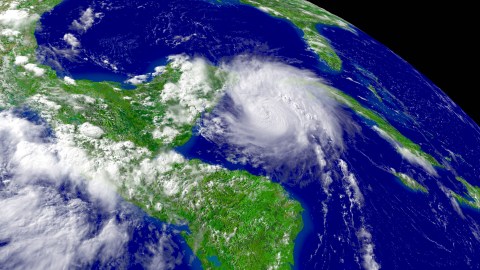A Mysterious Ocean Sound Discovered That Can Be Heard from Space

It’s hard to remember some times, but we really don’t know everything, and the world is still full of wonders. And some of the greatest mysteries we can explore come from the Earth’s oceans. Scientists from the University of Liverpool in the UK have discovered a strange sound emanating from the Caribbean Sea (part of the Atlantic Ocean).
This whistle-like sound is so remarkable that while it’s too low to be heard by human ears, it can be picked up from space! They detected the sound when studying regional sea level and pressure changes, focusing specifically on the Caribbean Sea, because of its key function in forming currents that feed into the Gulf Stream.
While their research investigated climate change, the scientists quickly realized something unusual was going on. They saw pressure oscillations in their model that just didn’t make sense.
“We were looking at ocean pressure through models for quite different reasons, and this region just didn’t work,” said Chris Hughes, one of the researchers. “It felt like a sore thumb.
By zeroing in on these oscillations, the scientists realized they produced a low noise, described as a “whistle”.
You can hear it here (pitched up):
The effect of this sound is so powerful that it can be measured in space by looking at the oscillations in the gravity field of Earth. Further detective work by the Liverpool researchers led them to recognize the sound as a Rossby Wave, which travels west on the ocean, right into the Caribbean basin, where it disappears only to reappear 120 days later back in the east. Apparently, this wave is causing the seafloor to whistle.
Hughes elaborated: “We can compare the ocean activity in the Caribbean Sea to that of a whistle. When you blow into a whistle, the jet of air becomes unstable and excites the resonant sound wave which fits into the whistle cavity. Because the whistle is open, the sound radiates out so you can hear it. Similarly, an ocean current flowing through the Caribbean Sea becomes unstable and excites a resonance of a rather strange kind of ocean wave called a Rossby wave. Because the Caribbean Sea is partly open, this causes an exchange of water with the rest of the ocean which allows us to ‘hear’ the resonance using gravity measurements.”
Pretty amazing.
If you’re curious, the note the wave makes is an A-flat tone (that’s about 30 octaves below the lowest note of a piano.)
The scientists think that this whistle, which they named “The Rossby whistle,” might be affecting the flow of the Caribbean Current and by extension of the entire North Atlantic Ocean.
Hughes explains the significance of this: “This whistle effect is sucking energy out of the current as it goes through the Caribbean Sea. That might actually have an influence on how the Gulf Stream and the whole climate system operates.”
Researchers now plan to continue studying the impact of the Rossby Whistle, with one focus being a greater capability in predicting coastal flooding.
You can read the Liverpool study here.
If you need further proof of the ocean’s amazing musical prowess, listen to this 70-meter Sea Organ, designed by the Croatian architect Nikola Bašić:
